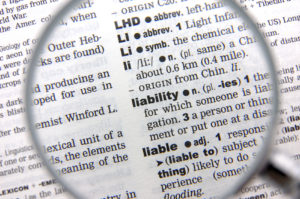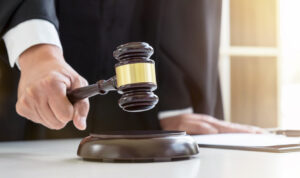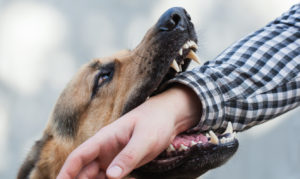
Strict liability means that a party is financially liable for damages for engaging in certain prohibited conduct. The injured party does not need to prove intent, negligence, or the person’s mental state to recover compensation for damages. Proving that the defendant’s conduct was the direct and proximate cause of the plaintiff’s injuries is sufficient to establish liability.
Three Personal Injury Cases Where Strict Liability Applies

Generally, strict liability is used in three types of personal injury cases – keeping wild animals, engaging in abnormally dangerous activities, and some products liability cases. Let’s look at each type of case in relation to liability laws.
Keeping Wild Animals (And Dog Bites)

Keeping wild or exotic animals as pets is inherently dangerous. The risk of injury or death to the public is very high should the animals escape.
If a party keeps wild animals, that party accepts the risk of liability if the animals harm another person. Even if the party takes reasonable measures to secure the wild animals, they are held strictly liable if the wild animals harm anyone. There could be exceptions for educational and government institutions that house wild animals for education or entertainment purposes.
Florida is a strict liability state for dog bites. Dog owners are held strictly liable if their dog bites or attacks a person, even if the dog has never shown any aggression before the incident. The dog owner is legally responsible for the damages caused by the dog.
Abnormally Dangerous Activities
Some activities are so unreasonably dangerous that the parties engaging in those activities are held strictly liable for any injuries or damages caused by the activity.
Generally, abnormally dangerous activities involve behaviors that pose a risk of serious harm to others that cannot be eliminated even with the highest level of care. Abnormally dangerous activities are not activities that people commonly engage in.
Examples of activities that might fall into this category for strict liability include, but are not limited to:
- Blasting and demolition
- Storing explosives
- Containment or production of radioactive emissions
- Disposing of hazardous chemical waste
- Fumigating, crop dusting, or mass use of poisons
- Digging canals
Abnormally dangerous activities are not limited to activities that cause physical harm. A party could be strictly liable for emotional damages and financial loss caused by an abnormally dangerous activity.
Product Liability
Strict liability may apply in some cases involving defective products. A manufacturer or seller could be strictly liable for damages if they place a defective product on the market. Here are a few areas of product liability where strict liability applies are:
Manufacturing or Design Defects
A product may be defective because of mistakes made during the design or manufacturing process. With a design defect, a product has a dangerous design that makes it unsafe to use. A party may be liable for a design defect that causes harm if the design is unsafe in a way that ordinary consumers would not expect and there is a safer alternative design available.
With a manufacturing defect, a product deviates from its design in an unsafe way — usually due to an error in the manufacturing process.
Manufacturers or sellers can be held strictly liable for damages caused by the defective product. The injured party does not need to show negligence or fault. They only need to prove that the product was defective and the defect was the direct and proximate cause of their injuries.
Breach of Warranty and Marketing Defects
A seller or manufacturer may issue an implied or explicit warranty that a product will work as intended. However, if the product fails to work and a person is injured, the company may be strictly liable for damages.
Likewise, a seller or manufacturer must warn consumers of the risks of using their product when the risks cannot be eliminated through manufacturing or design. If the parties fail to offer a warning and a consumer is hurt by the product, they can be held liable for a marketing defect.
What Damages Can You Recover for a Strict Liability Case?
Injured victims in strict liability cases may seek compensation for the same types of damages as victims of other types of negligence claims.
If the party who caused your injury is found strictly liable for damages, you could receive compensation for:
- The cost of your medical treatment and care
- The cost of nursing care and personal care
- Loss of income, including reduced earning capacity because of permanent impairments
- Physical pain and suffering
- Loss of enjoyment of life
- Mental anguish and emotional distress
- Disabilities and impairments
- Physical, emotional, occupational, and other types of therapy
- Reduced quality of life
Even though you may not need to prove intent or negligence to hold a party strictly liable for damages, you must prove the required legal elements for strict liability. The evidence you need could vary depending on the type of case. For that reason, it is wise to seek legal advice from an experienced attorney as soon as possible.
Documenting financial damages requires keeping receipts, invoices, bills, and other proof of expenses and payments. Keeping a detailed record of all financial damages can make it easier to settle your injury claim after completing medical treatment.
Proving pain and suffering damages is more challenging because everyone suffers differently. Write down your struggles to recover from your accident injuries in a journal. Make notes about how the injury impacted your daily life and the pain you experienced.
Schedule a Free Consultation With Our Florida Personal Injury Lawyers
You may be entitled to compensation for damages if another party is responsible for causing your injury. Roman Austin Car Accident and Personal Injury Lawyers can help advise you on the viability of your claim and how best to proceed. Contact our office at (727) 787-2500 for a free case review from an experienced Clearwater injury lawyer.

